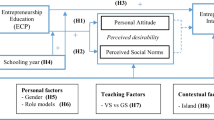Abstract
Should entrepreneurship education be the same in every country or should it be adapted to each context? In addition to answering this question, it appears to be important to identify the concerns students have regarding their entrepreneurship education programs, so as to strengthen their perceptions of feasibility and desirability of an entrepreneurial career. In this article we examine whether differences exist among American, Asian and European students in terms of entrepreneurial intentions and dispositions, as well as motivations and perceived barriers for business startup. Results indicate that entrepreneurial disposition and intentions differ by country but that students across countries are motivated and/or discouraged by similar variables. However, our results indicate that the levels of sensitivity to each motivator and barrier differ by country. Our results support the argument made by past researches that cultural differences should be taken into consideration when develo** entrepreneurship education programs.
Similar content being viewed by others
Notes
The completed questionnaire is available on request from the authors.
For the Chinese and Indian students, verbal clarifications were given when necessary during survey administration.
Normality is assumed.
The alternative hypothesis (H1) was that for at least one group, the impact of one of the factors would be significantly different from the other groups.
References
Bell, J., Callaghan, I., Demick, D., & Scharf, F. (2004). Internationalizing entrepreneurship education. Journal of International Entrepreneurship, 2(1/2), 109–124.
Boissin, J. P., Branchet, B., Emin, S., & Herbert, J. I. (2009). Students and entrepreneurship: a comparative study of France and the United States. Journal of Small Business and Entrepreneurship, 22(2), 101–122.
Bosma, N., Jones, K., Autio, E. & Levie, J. (2007). Global Entrepreneurship Monitor, 2007 Executive Report, Babson College and London business School.
Carayannis, E. G., Evans, D., & Hanson, M. (2003). A cross-cultural learning strategy for entrepreneurship education: outline of key concepts and lessons learned from a comparative study of entrepreneurship students in France and the US. Technovation, 23(9), 757–771.
Fayolle, A., & Kickul, J. (2007). New and emerging perspectives for future research in entrepreneurship education. In A. Fayolle (Ed.), Handbook of research in entrepreneurship education, vol. 2 contextual perspectives (pp. 1–10). Northampton: Edward Elgar.
Filion, L. J. (2009). In B. Surlemont & P. Kearney (Eds.), Foreword. Brussels: De Boeck Université.
Fiske, D. (1982). Convergent-discriminant validation in measurement and research strategy. In D. Brinsberg & L. Kidder (Eds.), New directions for methodology of social and behavioral sciences: Forms of validity in research (pp. 77–92). San Francisco, CA: Jossey Bass.
Galloway, L., & Brown, W. (2002). Entrepreneurship education at university: a driver in the creation of high growth firms? Education & Training, 44(8/9), 398–405.
Genescá, E., & Veciana, J. M. (1984). Actitudes hacia la Creación de Empresas. Información Comercial Española, n°, 611, 147–155.
Hills, G. E. (1988). Variations in university entrepreneurship education: an empirical study of evolving field. Journal of Business Venturing, 3(2), 109–122.
Hsu, J. C. (1996). Multiple comparisons theory and methods. London: Chapman and Hall.
Klapper, R. (2004). Government goals and entrepreneurship education—an investigation at a Grande Ecole in France. Education & Training, 43(3), 127–137.
Krueger, N. F., & Brazeal, D. V. (1994). Entrepreneurial potential and potential entrepreneurs. Entrepreneurship Theory and Practice, 18(3), 91–104.
Kuratko, D. F. (2005). The emergence of entrepreneurship education: development, trends, and challenges. Entrepreneurship Theory and Practice, 29(5), 577–597.
Lee, S. M., & Peterson, S. J. (2000). Culture, entrepreneurial orientation, and global competitiveness. Journal of World Business, 35(4), 401–416.
Lee, S. M., Chang, D., & Lim, S. B. (2005). Impact of entrepreneurship education: A comparative study of the U.S. and Korea. International Entrepreneurship and Management Journal, 1(1), 27–43.
Lee, S. M., Lim, S. B., & Pathak, R. D. (2009). Culture and entrepreneurial orientation: a multi-country study. International Entrepreneurship and Management Journal. doi::10.1007/s11365-009-0117-4.
Lüthje, C., & Franke, N. (2003). The ‘making’ of an entrepreneur: testing a model of entrepreneurial intent among engineering students at MIT. R & D Management, 33(2), 135–147.
Mitchell, R., Smith, B., Seawright, K. W., & Morse, E. A. (2000). Cross-cultural cognitions and the venture creation decision. Academy of Management Journal, 43(5), 974–993.
Noorderhaven, N., Thurik, R., Wennekers, S., & Van Stel, A. (2004). The role of dissatisfaction and per capita income in explaining self-employment across 15 European countries. Entrepreneurship Theory and Practice, 28(5), 447–466.
Peterman, N. E., & Kennedy, J. (2003). Enterprise education: Influencing students’ perceptions of entrepreneurship. Entrepreneurship Theory and Practice, 28(2), 129–144.
Pittaway, L., & Cope, J. (2007). Entrepreneurship education: a systematic review of the evidence. International Small Business Journal, 25(5), 479–510.
Pruett, M., Shinnar, R. S., Toney, B., Llopis, F., & Fox, J. (2009). Explaining entrepreneurial intentions of university students: a cross-cultural study. International Journal of Entrepreneurial Behaviour and Research, 15(6), 571–594.
Shane, S., & Venkataraman, S. (2000). The promise of entrepreneurship as a field of research. Academy of Management Review, 25(1), 217–226.
Shinnar, R. S., Pruett, M., & Toney, B. (2009). Entrepreneurship education: attitudes across campus. Journal of Education for Business, 84(3), 151–158.
Souitaris, V., Zerbinati, S., & Al-Laham, A. (2007). Do entrepreneurship programs raise entrepreneurial intention of science and engineering students? The effects of learning, inspiration and resources. Journal of Business Venturing, 22(4), 566–591.
Veciana, J. M., Aponte, M., & Urbano, D. (2005). University students’ attitudes towards entrepreneurship: a two countries comparison. International Entrepreneurship and Management Journal, 1(2), 165–182.
Wilson, F., Marlino, D., & Kickul, J. (2004). Our entrepreneurial future: examining the diverse attitudes and motivations of teens across gender and ethnic identity. Journal of Developmental Entrepreneurship, 9(3), 177–197.
Zhao, H., Seibert, S. E., & Hills, G. E. (2005). The mediating role of self-efficacy in the development of entrepreneurial intentions. Journal of Applied Psychology, 90(6), 1265–1272.
Acknowledgement
Frank Janssen and Olivier Giacomin wish to thank the Banque Nationale de Belgique for its financial support.
Author information
Authors and Affiliations
Corresponding author
Rights and permissions
About this article
Cite this article
Giacomin, O., Janssen, F., Pruett, M. et al. Entrepreneurial intentions, motivations and barriers: Differences among American, Asian and European students. Int Entrep Manag J 7, 219–238 (2011). https://doi.org/10.1007/s11365-010-0155-y
Published:
Issue Date:
DOI: https://doi.org/10.1007/s11365-010-0155-y




